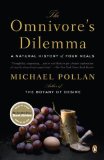
If you want to become healthier or lose weight, or perhaps you are just interested in knowing more about what you are eating, I highly recommend The Omnivore’s Dilemma: A Natural History of Four Meals
by Michael Pollan. This bestselling book has truly changed my family members’ lives for the better, giving us a rather shocking understanding, at times, of what we were actually eating.
“What should we have for dinner?” is the opening question, which is part of the omnivore’s dilemma. Your answer may, indeed, change once you read this book. Mine did. I’ll never look at processed foods the same way again.
Pollan, in writing about how our food is grown, breaks the book into three parts: the first section discusses the industrial food supply (including the processed foods with the unpronounceable ingredients, shedding light on some of them); the second topic is organic food, both from a big business and the other from a small farm perspective; in the third, Pollan hunts and gathers his own food.
The industrial food supply section is the most disturbing on multiple levels and presents a wake up call. We are fed mostly by corn and fossil fuel — oil — used to grow, transport, and heavily process that corn into an unimaginable number of products and food ingredients that aren’t necessarily recognizable as corn. Animals never meant to eat corn are forced to eat it to fatten them up quickly. If this ubiquitous grain is fattening those animals, what is it doing to people who are eating those animals and the corn-laden processed food products? Pollan describes the health problems the overabundance of corn in our diets is presenting: heart disease, obesity, type 2 diabetes, inflammation, etc.
Reading The Omnivore’s Dilemma: A Natural History of Four Meals truly opened my eyes to what I was eating. Pollan writes, “…of the 45,000 items in a supermarket, more than a quarter contain corn.” Once I started scrutinizing ingredient lists for corn products, I was horrified to learn that even many so-called healthy foods contain corn, such as Yoplait yogurt (which contains high-fructose corn syrup) and store-branded cottage cheese (which has hidden corn products. See my article “Are Corn and Other Food Additives Causing Weight and Other Health Problems?”). Wow! I stopped buying these brands and switched to healthier brands, such as Daisy cottage cheese and sour cream and Dannon low-fat vanilla yogurt. Now, I’m just buying plain Greek yogurt.
Just by cutting out many of the products with corn, switching to a healthier brand, or making the product myself, my husband and I started to lose weight. We weren’t watching calories or anything else at the time.
Seriously, read this book if you want to prolong someone’s life, including your own.
Rating: ♥♥♥♥♥ (5 out of 5)